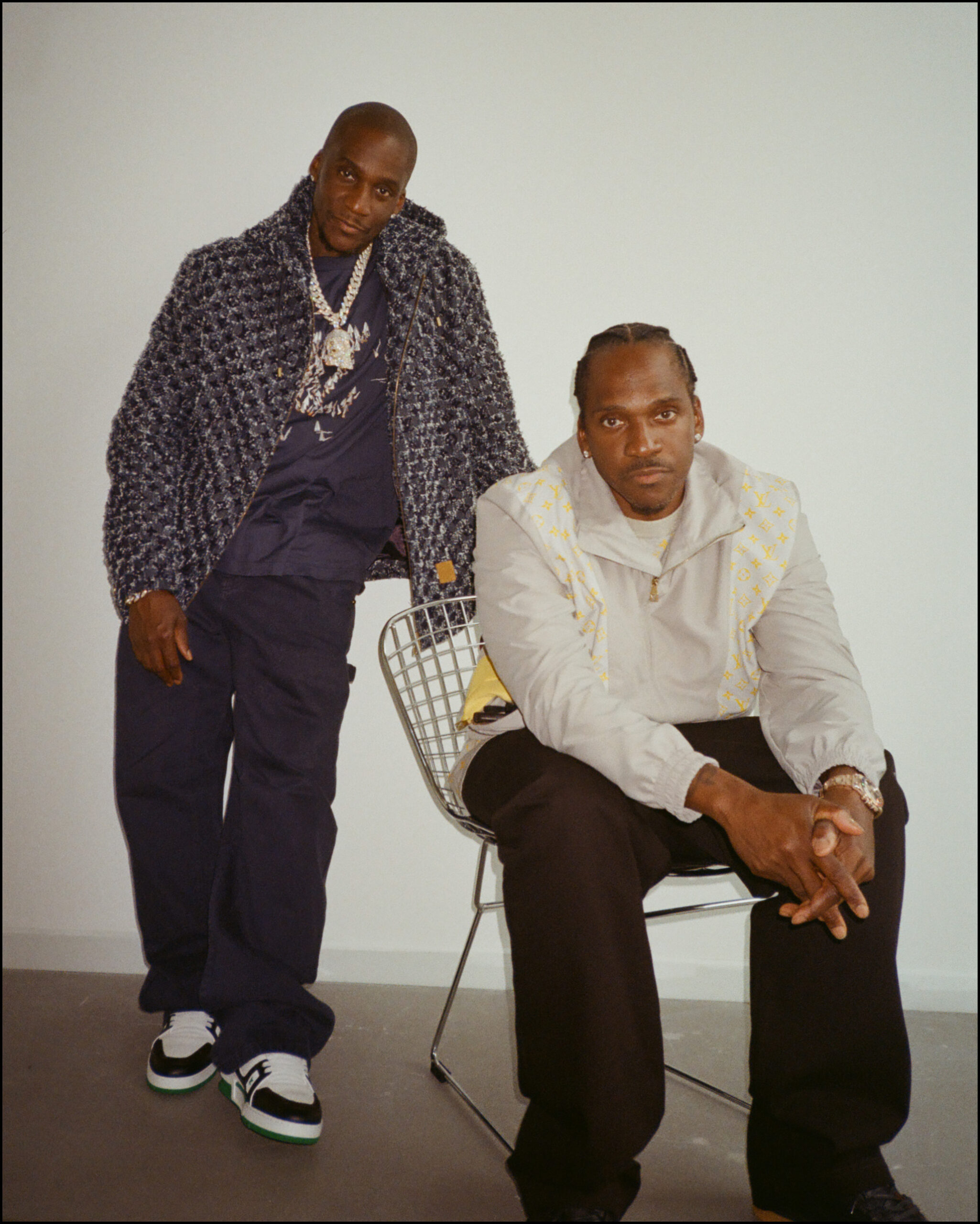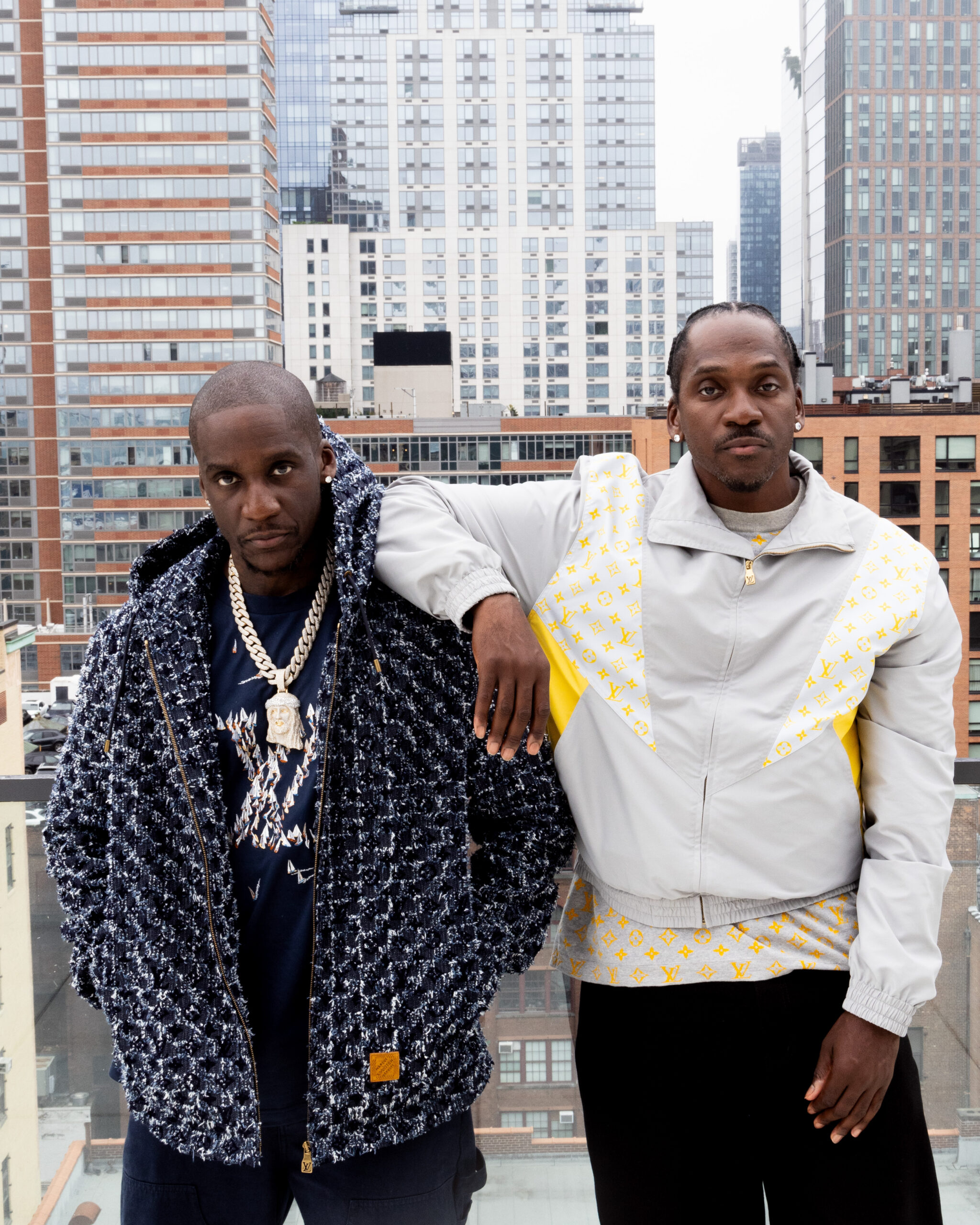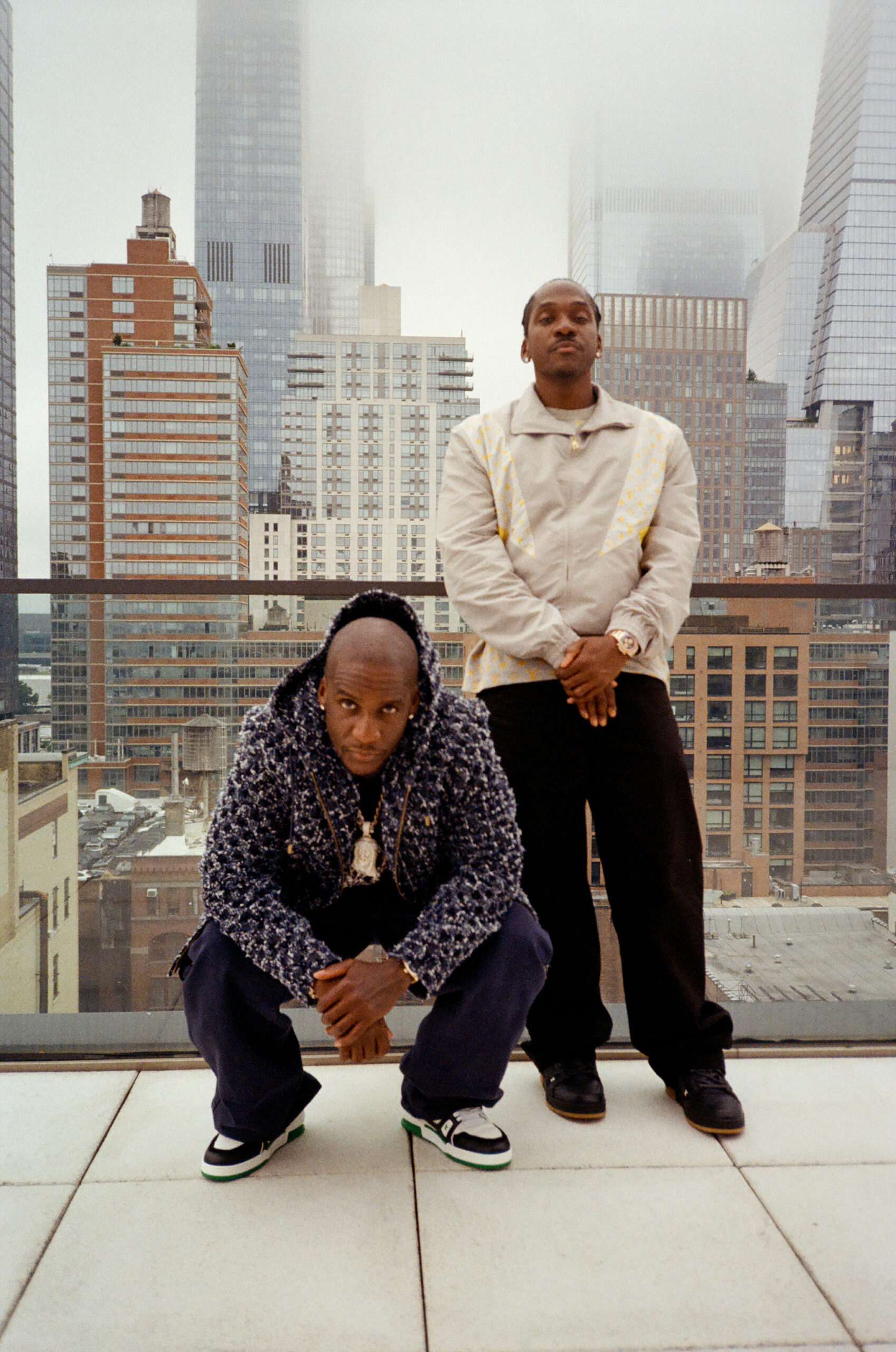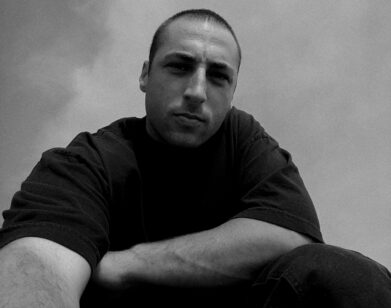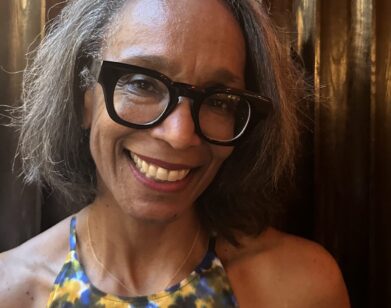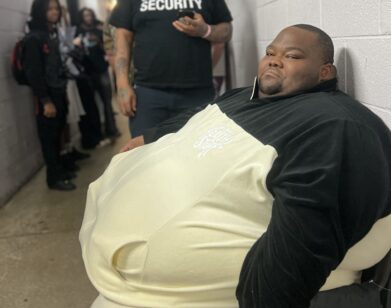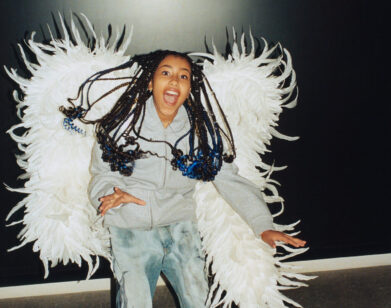BROTHERS
The Clipse Reunion Is Hip-Hop’s Hard Reset
After 15 years years, hip hop’s most incisive duo is locked back in. Brothers Pusha T and Malice parted from Clipse in 2010 amidst spiritual awakenings and legal issues, forcing them each into solo careers. After two documentaries about the group’s demise, fans thought they’d never see them together again. But this Friday, after years of revival rumors and solo detours, Clipse is dropping an album. Let God Sort Em Out is produced entirely by Pharrell, their longtime collaborator and fellow Virginian. The album opens with a somber eulogy for their late parents featuring John Legend, and stacks verses from Kendrick Lamar and Nas alongside raw, unorthodox beats. But at its core, this reunion is about more than just music. “We wouldn’t let anything come between our relationship,” says Malice. “We’d let the whole thing burn down first.”
———
MEKALA RAJAGOPAL: What do you remember most about the earliest days of Clipse trying to make it?
PUSHA T: I remember the fact that we would travel to New York with demos, thinking that we’re talking to A&R people, but really we were talking to the mailroom clerks. I also remember the idea of just getting on with straight music. I remember us trying to get into the New York mixtape scene, and we would put records out, but they would never land. That was the big thing for rappers at the time. Our manager at the time, Rob Walker, would be like, “Hey man, what’s going to be your story? You were never in any hot battles.” Rap was so street corner rap battle-based back then, and he was like, “Y’all ain’t in the mix of the battle circuit.” We were in Virginia, so it was less competitive and more about the creation of music for us. Everybody who was getting on was in these battle circuits and hopping from studio to studio and record label to record label, and that’s how a lot of artists back then made their names.
MALICE: I definitely remember us congregating with Chad [Hugo] and Pharrell, hopping in Chad’s burgundy Volvo station wagon, and driving from Virginia Beach all the way to New York. A lot of people thought us getting a deal just happened out of Virginia, but little did they know that we actually had to hunt with the demo in the metropolis. We couldn’t just stay home.
RAJAGOPAL: Were there any challenges to being brothers in a duo?
MALICE: I would have to say that there are none. Our cohesiveness is unmatched. It’s no friction. We have always respected each other’s decisions. We agree that there is a standard that must always be met, and when you agree on the big picture, you just do whatever it takes to accomplish it. Whatever is conducive to that, we’re always in agreement.
PUSHA T: Fully agree.
MALICE: I will say, our integrity and our loyalty to one another is such that we wouldn’t let anything come between our relationship, and Pusha feels the same way. Before anything would ever cause any kind of friction between us, we’d let the whole thing burn down first.
RAJAGOPAL: How did going solo change how you look at coming back together?
PUSHA T: Man, for me, going solo has made me fully miss being in a duo. You’re really out there alone. Having somebody to lean on that’s looking over your back, it makes everything else that much easier. There’s just a lot of responsibility and heavy lifting as a soloist, to be honest.
MALICE: The rapping part of it, that’s the easy part. I’m just glad to be able to be with my brother and travel together, since the road is such a huge part of being in this industry. That’s definitely one of the perks.
RAJAGOPAL: What is your definition of success, and how has that changed over time?
MALICE: My definition of success is, one, I definitely put god first in everything I do. Secondly, being in a position to take care of your family and your friends and serving anyone who may need something, and I don’t just mean financially. Being able to give them a word that will inspire and encourage them.
PUSHA T: Yeah. I feel like success, especially in the music business, is being able to create as you please without having to conform and chase trends. It’s being able to be your natural self in this game and still have a fan base that’s waiting on you, that’s loud, that’s coming out to your shows.
MALICE: Yeah, the freedom is everything. And to have a fan base that is going to speak for you when they see the injustices you go through, we appreciate that a lot.
RAJAGOPAL: Do you have any crazy fan memories?
MALICE: I think the biggest thing for me is the tattoos. People get tattoos on their face and body like, “Clipse,” or a quote or verse that we’ve said. I mean, I remember wanting to tell them, “No man, don’t do that,” and feeling bad, but it was too late. Our fans go hard.
PUSHA T: I think of the age range I’m seeing in the crowd these days. It’s 16 to 55, and I’m like, “Wait a minute.” Then you hear their entry points to the music, and the young ones not knowing the whole discography, which is crazy. I was such a rap fan, so much so that I had to know everything about the artists. I get a bit envious too, because it’s like, man, if you became a Pusha T fan on Daytona, and you didn’t learn about Lord Willing or Hell Hath No Fury, you get to hear that with fresh ears. I wish I could listen to some of my favorites with fresh ears today.
PUSHA T: Malice, what made this the right time for us to bring the group back together?
MALICE: We waited until the time was definitely right. I think going out to Wyoming and working on the Jesus is King album showed us that we could still make music without compromising. Definitely working on the Nigo album, and working on your album, It’s Almost Dry, and seeing the fans’ responses knowing that it was still a commodity. I think it’s the perfect time, as it has proven to be.
PUSHA T: Anytime would’ve been the perfect time for me, honestly. But right now, though, the stars have basically aligned, and the different exercises like the Kanye and Nigo albums were the stepping stones to knowing that as a group, this was still fun to us, and we could still find that competitive spirit to take on this industry.
MALICE: Well, we know who we are in this game. We know what we bring to the table. There was never any doubt that we knew how to make a record together, so we always knew that we could come back together and do it.
RAJAGOPAL: What do you think Pharrell brought out of you on this album?
PUSHA T: I think that Pharrell brought a heightened level of song structure to this Clipse project. He set the boundaries when it came to flows and stencils and patterns, with the idea of making even the hardest records sticky and catchy. Then you’re able to follow the lyricism.
MALICE: T, what do you think the difference was for you, working with Kanye and working with Pharrell?
PUSHA T: I think one of the differences in working with Pharrell is that it’s a little bit more self-contained. I feel like when you work with Kanye, it’s a host of characters, from musicians to—
MALICE: Architects.
PUSHA T: Architects. It’s a lot of people in the mix. And with Kanye, there’s more of an editing process. With Pharrell, everything is so based on feeling. When it feels right, we finish it, and we live in that, versus going back to edit it and try to make it better.
RAJAGOPAL: On this project, you recorded a lot in Paris with Pharrell, basically at a working atelier at Louis Vuitton. Did you feel the energy of that?
PUSHA T: Oh man, the backdrop of Louis Vuitton headquarters in Paris was definitely made for the luxury aspirational street rap that we made on this album.
MALICE: I agree.
RAJAGOPAL: How do you know when a beat is really Clipse?
MALICE: It’s a feeling. It doesn’t have to grow on you. When a beat gives you the chills and just makes you want to rhyme. The beat is always the foundation and the canvas. And more often than not, the Neptunes sound was also made by the beat basically painting the picture. T, what do you think?
PUSHA T: I think a beat for us is when it’s unorthodox and has that knock, and the space to actually let our voices and our rhymes cut through.
RAJAGOPAL: Speaking of unorthodox, what do you think is one thing that y’all did that you don’t really get credit for?
PUSHA T: Man, unlike a lot of artists, we never chase the trends. I don’t think people say enough that we built a brand that people have grown to trust because they know exactly what they’re going to get. Every time we drop, it takes them back to other moments in our careers.
MALICE: Oh, yeah. It’s the exact same feeling we get from previously making music. Our fans have followed Pusha all through his solo career. They’re still out there wearing Clipse shirts or whatever.
RAJAGOPAL: Do audiences today listen better or worse than they used to?
MALICE: I think they listen according to what they have to choose from. Us being pioneers of lyric-driven hip-hop, we always get the ear of the listeners. But a lot of times now, everything is a vibe, and people make music that you can vibe to. I enjoy some of it, but you don’t have to necessarily even understand what’s being said. It just depends on what your taste is and what you’re looking for.
PUSHA T: And I think that we embody the culture of hip-hop. That is rap, fashion, and the mix of hip-hop and rap. I feel like when you’re of the culture, the fans adapt to what it is that you do. So we may not have the same style as vibey rappers, but people who know lend an ear because it’s what we do.
MALICE: T, how hard was it for you writing your verse on “Birds Don’t Sing”? You were recounting your last conversation with our mom, and I was doing the same with our dad.
PUSHA T: Man, “Birds Don’t Sing” had to be the hardest verse I’ve ever written. It took all of four days of gut-wrenching reminiscing, and trying to put it all on paper was such a heavy task. Like I said earlier, we did this in LV headquarters, so people were actually hearing and seeing the emotion in the room. It was definitely one of those verses that’s going to go down in history for me, just with really tapping into the emotion and being as honest and as vulnerable as I’ve ever been on a song.
MALICE: Yeah, I agree. It was hard for me too, from an emotional standpoint, coming up with verses. It’s our parents, and you want to do them justice in sharing with the world exactly who they were as people and what they meant to us. At the same time, with every line, you’re reminded of your own personal grief while trying to express that to the listener. I also believe that this is something that everybody goes through. Everyone is familiar with loss of some sort, and hopefully this can serve as healing for them as well.

